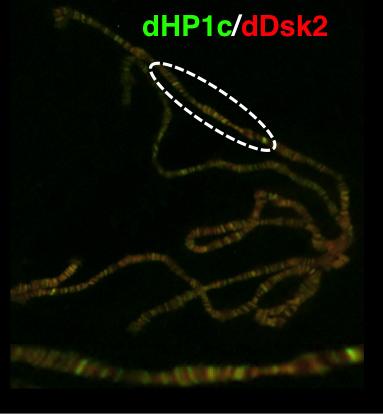Discovery of an unexpected function of a protein linked to neurodegenerative diseases

This is a microscope image of polytene chromosomes from Drosophila melanogaster, in which, using staining techniques, scientists have visualized the protein dDsk2, a molecule never previously associated with chromatin (image: R. Kessler, IRB Barcelona)
Until today, the proteins known as ubiquitin receptors have been associated mainly with protein degradation, a basic cell cleaning process. A new function now described for the protein dDsk2 by the team headed by Ferran Azorín, group leader at the Institute for Research in Biomedicine (IRB Barcelona) and CSIC research professor, links ubiquitin receptors for the first time with the regulation of gene expression.
This discovery, published today in Nature Communications, opens up a double scenario, one focused on basic epigenomic research and the other biomedical, because of the link between dDsk2 and neurodegenerative diseases.
Double role of ubiquitin
In humans, there are about 100 proteins associated with ubiquitination, the process by which a protein labelled with ubiquitin is removed from the cell by specific cell machinery known as the proteosome. Ubiquitin receptors are involved in the detection of ubiquitination.
Ferran Azorín, head of the “Chromatin structure and function” group says, “although previous data pointed to the possibility of ubiquitin receptors also contribute to cell processes, data were scarce and a direct role in gene regulation had not been demonstrated.”
“Ubiquitination related to transcription proteins and to DNA repair had previously been described. But this is the first time that a protein, dDsk2, that recognises the ubiquitination of a histone, a protein that forms part of chromatin, has been identified.” Chromatin is a complex formed by DNA and histones –proteins tightly bound to DNA– packaging it into chromosomes and determining gene expression, a process known as epigenetics.
Recent years have brought about the discovery of the fundamental contribution of epigenetics to the development of disease. “We have now opened a new perspective for ubiquitin receptors and we should further this research”, explains Roman Kessler, a Swiss “la Caixa” PhD fellow at IRB Barcelona and first co-author of the paper. In the study, the researchers also reveal the molecular mechanism through which the protein dDsk2 binds to chromatin proteins, thus participating indirectly in the regulation of transcription.
The protein in neurodegenerative diseases
Subjects with Alzheimer's disease and other neurodegenerative pathologies such as Huntington's, have a mutation in the protein ubiquilin, the homologue of dDsk2 in humans. “The role of these mutations in the onset and development of disease is still unknown,” says Johan Tisserand, postdoctoral research and co-author of the study who is continuing with the project.
“Now that we have discovered this new function, we aim to study whether it affects degradation or transcription, although probably both processes are altered. Our goal is to work towards unravelling these effects,” concludes Ferran Azorín. The new studies will be performed on Drosophila melanogaster and in cells in vitro.
###
Reference article:
The ubiquitin receptor dDsk2 regulates H2Bub1 and RNApol II pausing at dHP1c-complex target genes
Roman Kessler, Johan Tisserand, Joan Font-Burgada, Oscar Reina, Laura Coch, Camille Stephan-Otto Attolini, Ivan Garcia-Bassets and Fernando Azorín
Nature Communications (2015). DOI: 10.1038/ncomms8049
Media Contact
All latest news from the category: Life Sciences and Chemistry
Articles and reports from the Life Sciences and chemistry area deal with applied and basic research into modern biology, chemistry and human medicine.
Valuable information can be found on a range of life sciences fields including bacteriology, biochemistry, bionics, bioinformatics, biophysics, biotechnology, genetics, geobotany, human biology, marine biology, microbiology, molecular biology, cellular biology, zoology, bioinorganic chemistry, microchemistry and environmental chemistry.
Newest articles

Properties of new materials for microchips
… can now be measured well. Reseachers of Delft University of Technology demonstrated measuring performance properties of ultrathin silicon membranes. Making ever smaller and more powerful chips requires new ultrathin…

Floating solar’s potential
… to support sustainable development by addressing climate, water, and energy goals holistically. A new study published this week in Nature Energy raises the potential for floating solar photovoltaics (FPV)…

Skyrmions move at record speeds
… a step towards the computing of the future. An international research team led by scientists from the CNRS1 has discovered that the magnetic nanobubbles2 known as skyrmions can be…





















